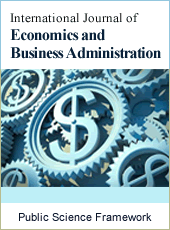International Journal of Economics and Business Administration
Articles Information
International Journal of Economics and Business Administration, Vol.7, No.1, Mar. 2021, Pub. Date: Mar. 29, 2021
Determinants of Promotion of International Trade and Economic Development
Pages: 18-27 Views: 1821 Downloads: 565
[01]
Dabo Abdoulrahaman, Department of Economics and Management, School of Economics and Management, Zhejiang Sci-Tech University, Hangzhou, PR China; School of Social Science, AM’s Research Academy, Dhaka, Bangladesh.
[02]
Yang Jun, Department of Economics and Management, School of Economics and Management, Zhejiang Sci-Tech University, Hangzhou, PR China.
For decades, trade has been a part of global growth. By stimulating economic growth, generating employment, lowering costs, growing the choice of products for customers, and helping countries acquire new technology, it has the potential to be a major factor for reducing global poverty. International trade has significant emphasis on foreign policy makers and analysts. Its value lies in the opportunity to purchase products that cannot be manufactured within the country or that can only be produced at higher prices. It also helps a country to export its domestically manufactured products to other nations around the world. The objectives of this study were to work out the connection between international trade and economic development in China. This study used Pearson Correlation model for empirical findings. Secondary data was used to conduct this study and the required data was collected from the National Bureau of Statistics of China, Wikipedia and from the website of Trading Economics. The study found that international trade is strongly positively correlated with economic growth (GDP) in China. This documentary research also examined the factors which affect international trade. Some identified factors include foreign policy, government policy, rate of exchange, foreign currency reserves, inflation, and demand. Solutions to the identified factors were offered at the top of the study. Past studies were reviewed and therefore the conceptual framework generated supported past findings. This study provides some Suggestions for investors, international business, as well as entrepreneurs.
Determinants, International Trade, GDP, China
[01]
The World Bank. "Trade Summary for the World." Accessed July 15, 2020. https://wits.worldbank.org/CountryProfile/en/Country/WLD/Year/LTST/Summary
[02]
Ahamad, Md. Impact of International Trade on Economic Growth in Bangladesh. International Journal of Science and Research (IJSR). 7. 1624-1627. (2018).
[03]
Afolabi, B., Danladi, J. D., & Azeez, M. I. International Trade and Economic Growth in Nigeria. Global Journal of Human-Social Science Research. (2017).
[04]
Shihab, R. A., Soufan, T., & Abdul-Khaliq, S. The causal relationship between exports and economic growth in Jordan. Global Journal of Management and Business Research. (2014).
[05]
Shan, J., & Sun, F. On the export-led growth hypothesis: the econometric evidence from China. Applied Economics, 30 (8), 1055-1065. (1998).
[06]
Frimpong Magnus, J., & Oteng-Abayie, E. Bounds Testing Approach: An Examination of Foreign Direct Investment, Trade, and Growth Relationships.
[07]
Li, Y., Chen, Z., & San, C. Research on the Relationship between Foreign Trade, and the GDP Growth of East China—Empirical Analysis Based on Causality. Modern Economy, 1 (02), 118. (2010).
[08]
Kehinde, A. O., Jubril, A. O., & Felix, A. O. Foreign trade, and economic growth in Nigeria: An empirical analysis. American Academic & Scholarly Research Journal, 4 (5), 1. (2012).
[09]
Onyali., I & Okafor, T. Foreign direct investment, and the Nigerian economy: Vision 2020 mission. International Journal of Business and Finance management, (2), 8-16. (2014).
[10]
Efiong, J. (2018). Effects of exchange rate fluctuations on foreign direct investment in Nigeria between 2001 and 2015. Account and Financial Management Journal. doi: 10.18535/afmj/v3i1.08.
[11]
Grotte de H. L., Linders G. J. The Institutional Determinants of Bilateral Trade Patterns, Kyklos vol 57, pp. 103-124. (2004).
[12]
Daud, M. & Nor A,. Islamic development bank (IDB), Foreign Aid and the challenges for sustainable development in Africa. International Journal of Business and Social Sciences, (2), 4.
[13]
Liargovas, P. G., & Skandalis, K. S. Foreign direct investment, and trade openness: The case of developing economies. Social Indicators Research, (106), 323-331. (2012).
[14]
Tinus, T. Achieving vision 2020 in Nigeria: A review of the economic and market-oriented business reforms. Journal of Sustainable Development in Africa, (12), 4. (2010).

ISSN Print: 2381-7356
ISSN Online: 2381-7364
Current Issue:
Vol. 7, Issue 4, December Submit a Manuscript Join Editorial Board Join Reviewer Team
ISSN Online: 2381-7364
Current Issue:
Vol. 7, Issue 4, December Submit a Manuscript Join Editorial Board Join Reviewer Team
| About This Journal |
| All Issues |
| Open Access |
| Indexing |
| Payment Information |
| Author Guidelines |
| Review Process |
| Publication Ethics |
| Editorial Board |
| Peer Reviewers |


